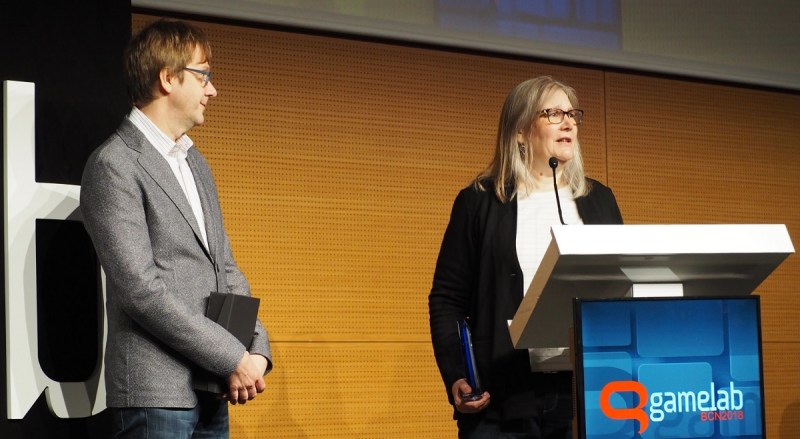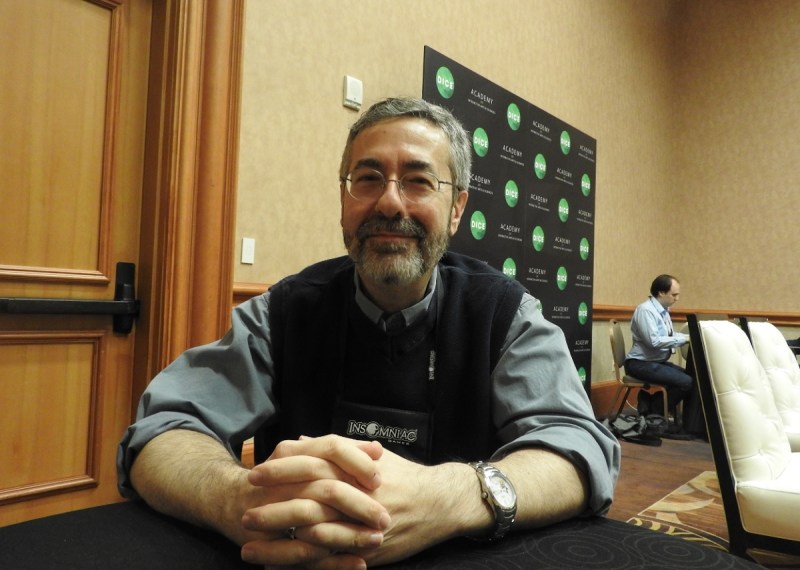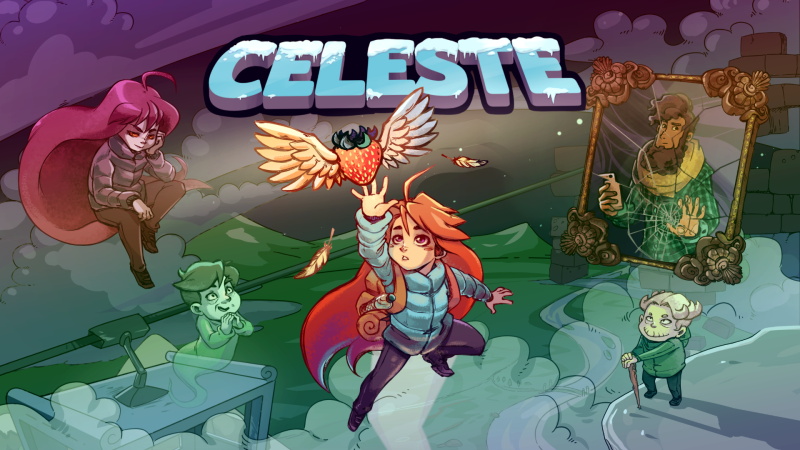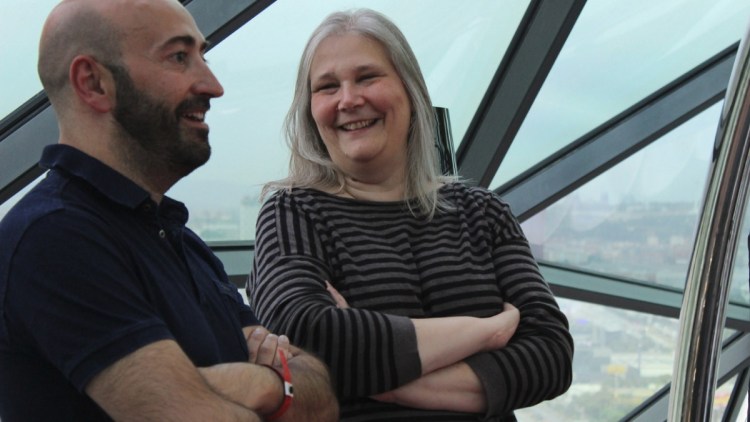
Above: Though her latest game was a failure, Amy Hennig received an award for her career making great games at Gamelab.
GamesBeat: With something like open worlds and missions, do you feel like that’s a good substitute for some of this? It seems like a way of addressing the demand from gamers for lots and lots of things to do.
Hennig: That’s the thing. It’s not even clear where the demand is coming from, if we’re going to call it that. A lot of times I say this stuff and people say they want to play smaller games, finite story games. Publishers aren’t necessarily funding them or making them. Big publishers, that is. I’m not sure.
I guess obviously there’s analytics and wisdom out there. People want to make sure they’re getting their money’s worth. They want a big long game they can dig into. Maybe they can only afford one game. They want to make sure there’s plenty of content to come back to. Of course there’s also the business side of it. If you keep them in there and keep monetizing, you make more money.
I’m always careful, because I don’t want to denigrate anybody else’s work. That’s not what I intend. There are different kinds of experiences. But part of it comes down, for me, to the semantics of story. A story has an author. There’s intent behind it. It has a deliberate shape. It has an arc, deliberate landmarks, and a deliberate ending. It gets back to the Aristotelian idea of this ending that’s both surprising and inevitable. You can’t accidentally do that through a bunch of random events. You’re not going to achieve that experience. What you’ll get is the equivalent of saying, “This happened, then this happened, then this happened.” That can be satisfying. I just wouldn’t call it a story.
June 5th: The AI Audit in NYC
Join us next week in NYC to engage with top executive leaders, delving into strategies for auditing AI models to ensure fairness, optimal performance, and ethical compliance across diverse organizations. Secure your attendance for this exclusive invite-only event.
The place for authored experiences that have that intentional shape — t’s not as common as it used to be. Or that experience is so stretched out, much longer than it was originally. I don’t remember how long the first God of War was versus the current God of War.
GamesBeat: The latest is 40 hours or something.
Hennig: And that was unheard-of. We were making games that were eight or nine hours long.
GamesBeat: And you can tell the section of the game where they stretched it out.
Hennig: Exactly. I’ve anecdotally heard — not just about God of War, but about other games as well — even the last Uncharted game, there are places where they say, “Let’s pad that out. Let’s open that up and give them some choice, some alternate missions.” That’s where people check out. The promise of some of these games is propulsion and pace. It’s not just saying, “Give me story in these little nuggets, in an endless stream.”
I find myself as this crotchety old story coot complaining about what, semantically, we mean by story. When people felt like games like Uncharted and The Last of Us were successful, it’s because the shape of the story is so deliberate. I don’t know how you do that systemically or with machine learning or AI, where you’re saying, “Let’s drop a story thing here that will be a downturn or an upturn, or that will feel like an act break.” No.
Again, I always make clear that I’m making a semantic argument. I’m not saying these things shouldn’t exist. But when we talk about players telling their own stories, I get the appeal of that. I just don’t think it’s a story. It’s a series of experiences that are very personal to you, and I get that. But story, by definition, means a beginning, a middle, and an end, deliberately. I love the idea of being able to confidently take players on that journey through these anchor points, but with all this agency between them.

Above: Warren Spector is going back to work on System Shock 3 for OtherSide Entertainment.
GamesBeat: Have you ever thought that you could get to interesting narratives from things that were procedural? Warren Spector’s been arguing that for a long time, that emergent gameplay will result in great stories.
Hennig: Maybe? I’m trying to remember. I don’t want to misrepresent what Warren has said. People have said it’s like Dungeons and Dragons. There’s an ad hoc quality to it. I’m not saying that we can’t have an improvisational quality where players can surprise us. But you still have a dungeon master. There’s still somebody guiding the experience. There’s still probably some sort of a plan, even if we may deviate from it. That person guiding the experience is trying to guide us to an ending that feels artful and meaningful and resonant, not toward “And now we’re done.”
It’s fascinating to think about whether you could say, “We know the principles of story. We can turn it into a system that would deliver meaningful twists and turns.” As an aid to storytelling I think that’s cool. As a replacement for writers I think that’s horrifying. It would feel like a story, but doesn’t a story imply that somebody, with their creative heart, is speaking to you?
GamesBeat: I guess it depends on how good AI gets.
Hennig: I joke about the fact that — it’s like those paintings done by machine learning. They all look like slugs and dog noses. I don’t want to hang that on my wall. I can be impressed that it made a picture, but there’s no soul behind it. I think fundamentally that’s what stories are about. You can feel the soul of the people writing it. If they do it well, you feel like they’re taking you on a journey, lightly bringing you by the hand.
GamesBeat: Do you think you can keep this all going in more of an indie startup company now? Is that where you are?
Hennig: Given the opportunity to start from scratch and not feel like I’m seeking a job at a big publisher or a big developer, I think that — it feels inevitable to me, particularly for those of us in California, that going with a smaller studio model, with external partners and distributed development — you see that a lot in the indie scene. You’ll have a lot of individuals working together to make a thing, and they could be all over, geographically.
That’s going to make a lot more sense. It’s more like the film and TV model, which means of course that unionization becomes even more important. If everyone’s a free agent, an independent contractor, coming together to make a thing, then we need protections.
I think ideally you have a very small production company, your key talent, your key directors and creatives, and then you have really strong partners who share the vision that can wax and wane. In the same way you might work with a VFX house. I think that’s becoming more and more common. You’d have your key design and programming talent inside the business, because so much iteration goes on there, but so much else of what we do can be externalized. With the advent of being able to work through vidcon and screen sharing and all this stuff, you don’t have to be — you can be geographically remote and still feel like you’re in the same room, pretty well. Trying to support a studio of 300 people is just insane.

Above: Do indie games like Celeste represent the future of storytelling?
GamesBeat: You don’t need $100 million for that kind of thing.
Hennig: Here’s the challenge. The stuff I was talking about — can we reach a wider audience that maybe doesn’t consider themselves gamers? They’re more used to the linear space. Can we gently introduce interactive content to them in a way that satisfies or scratches an itch for them? I think one of those hurdles for them might be fidelity. If you do something more in the indie scene, you’re sacrificing some of that trying to chase photorealism. But I think once it looks like a game, or it looks too stylized, or it looks like a kids’ show, you lose people who think it’s not for them.
For me too, I have been chasing this goal of believable characters, nuanced human characters. I don’t really want to abandon that, because I feel like everything is changing so fast that if I stepped away from that to do something stylized, stepping back into that might be difficult. I’m fascinated by that problem. We were working on that a bunch in the Star Wars game. I have some unfulfilled desire to see something like that through. But it’s not cheap, is what I’m getting at. I don’t think that means $100 million, but….
GamesBeat: It’s interesting that there are these movements toward what Epic was calling digital humans. I heard more recently from Edward Saatchi from Fable that they’re doing “virtual beings.” They’re trying to marry AI with animation to make the leap, to make something that feels like a real person.
Hennig: That’s critical. But all of that is still in service to creators, human creators and visionaries and storytellers, to aid them as opposed to replacing them. But yes, I’m fascinated by that. I talk to Kim Libreri at Epic a lot. We share the same goals in virtual production, where we want to get.
GamesBeat: If they can help you do it more inexpensively, that’s a good thing.
Hennig: That would be awesome. But certainly having brilliant technical partners in the space is great too. I’ve been fortunate to have a lot of good connections in the industry that I can draw from for advice, guidance, or potentially partnership, that are some of the best of the best. I would love to be able to do what I’m describing, to have this small nugget of core employees, but then have all of these external partners that may be working at a company like Epic and other external vendors. Pick the best of the best and not feel like your whole business is trying to maintain a large studio.

Above: Epic Games’ Siren demo is an example of digital humans.
GamesBeat: You may need the digital human technology, but you don’t need to have an open world stuck in the middle of your story.
Hennig: Exactly. Again, I can only go by anecdotal feedback, but so many of my gamer friends say, “That’s where I put the game down.”
GamesBeat: That’ll save you $50 million, too.
Hennig: Exactly, there’s that. I don’t think — look, we could argue dogmatically about what a game is or isn’t. I think it’s silly. Our language is reductive. But the whole point of having this crafted journey that you’re taking the player on — this is why I was using Florence as an example. Journey is another example. Edith Finch is a great example.
That’s a very deliberate experience. The way you interact with it means that you feel that experience differently than another person who plays it. The fact that all of your interactions are sort of analog. But the flow of that story, fundamentally, is not going to change that much for everyone. You’re still going to hit these same anchor points. It’s what happens in between them that’s personalized for you, because it’s your own experience. It’s personalized not because you’re flipping binary switches and making choices. It’s because you’re in there exploring the interactive space, the world, in an analog fashion.
An open world doesn’t really fit into that much. I think those games are wonderful, but it’s a different kind of experience. It wants to be more — I don’t know if “curated” is the right word, but a more focused and deliberate kind of thing. It’s more like playing a TV show, to put it in the most crass language, or playing a movie, which is where I started with all of this.
GamesBeat: I thought Joseph Fares’ A Way Out is maybe a good example of the kind of thing you might be talking about.
Hennig: In certain ways. The co-op aspect of it, which was really clever, also probably narrowed its audience in some ways. But yeah. Obviously I think he’s an admirer of Naughty Dog’s games. You can see a lot of the DNA there. But it’s that same thing. If you break down Uncharted chapter by chapter, it’s a lot of handoffs between little cinematic moments and gameplay sequences that are very short. It’s all in the interest of keeping things pumping along, keeping the propulsion of the game and story.
I think Joseph did something similar. There’s a very crafted journey, but the way you go about solving your problems and moving through that world, the pace that you set, defines your experience somewhat.
GamesBeat: Do you have any hindsight yet on your time with EA and Star Wars.
Hennig: Oh, I don’t know. I think I’m still in the middle sight. I guess you’d have to give me a narrower topic than that. Which part of it?

